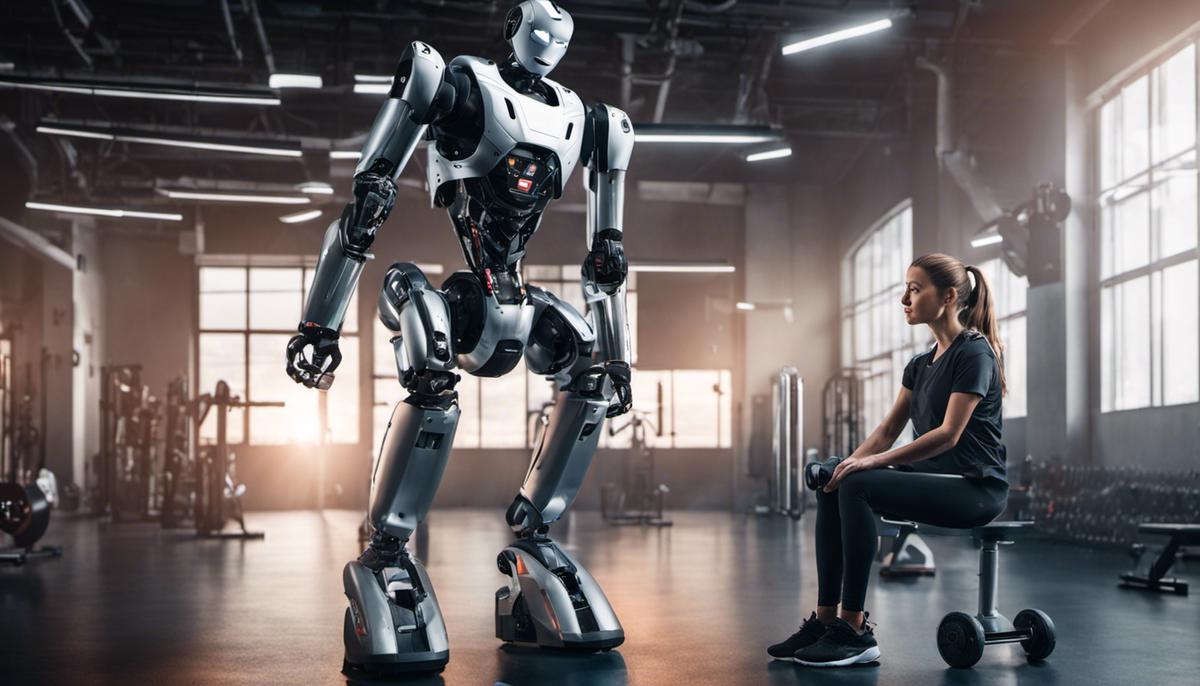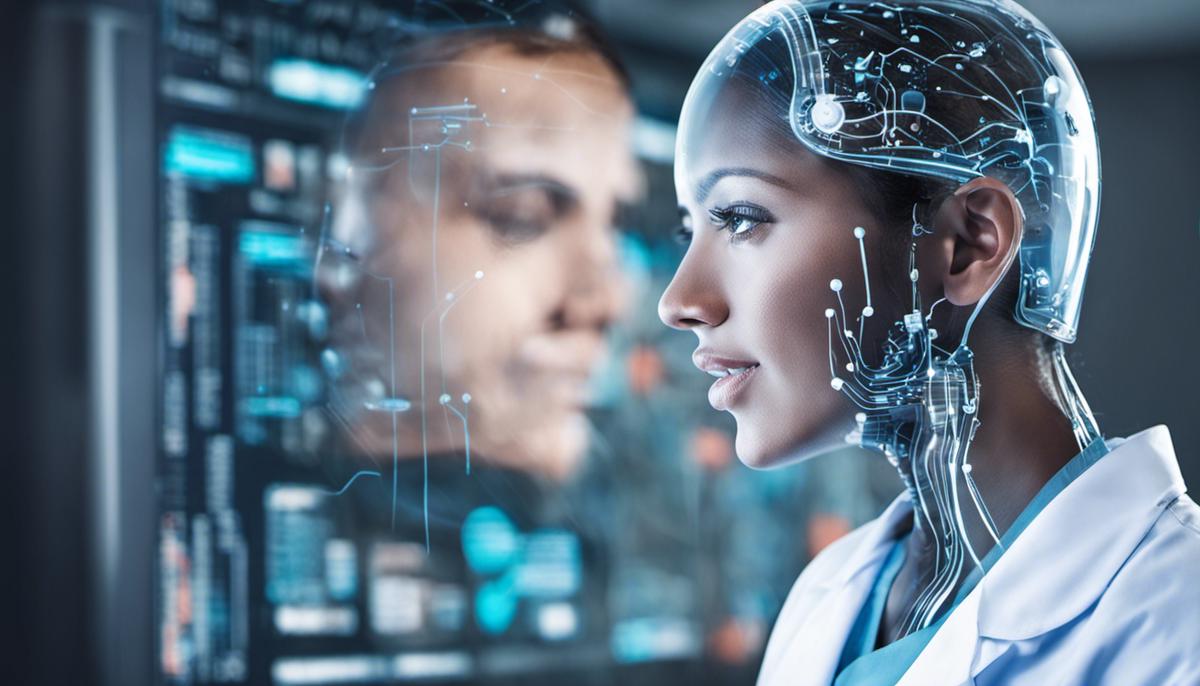As the digitization of many realms continues to gain steam, the health and fitness sector is one of those witnessing a profound transformation. At the forefront of this metamorphosis is the integration of advanced artificial intelligence technologies that promise a paradigm shift in the way we view and manage our health, fitness, and overall wellbeing. This shift is characterized by sophisticated AI capabilities like machine learning, natural language processing, and predictive analysis, with these technologies dynamically influencing personalized workouts, dietary plans, and healthcare management systems. The digital health revolution, built upon AI foundations, has paved the way for advanced healthcare services that exceed our traditional health management systems, promising better and more efficient approaches to promote wellbeing.
Understanding Artificial Intelligence in Health & Fitness
Unveiling the Revolution: How Artificial Intelligence is Transforming the Health and Fitness Industry
Artificial intelligence (AI) —the cutting-edge technology that has profoundly altered numerous notable sectors— is carving a distinct path in health and fitness. The industry, once fettered by traditional systems, has redefined its operations following the integration of AI, elevating services from mere weight management regimens to holistic health and wellness solutions.
In fitness, AI-based systems offer personalized training regimens. By adapting in real-time to users’ capabilities and monitoring their vital signs, AI algorithms design an ideal fitness program. The workout plans vary significantly based on factors like response to effort, energy expenditure, and body mechanics. They cater to specific user needs, thereby reducing injury risk and optimizing performance.
AI systems, in tandem with robotics and sensor technology, have evolved into exercise companions. Sophia, a humanoid robot developed by Hanson Robotics, showcases AI’s tremendous potential in facilitating workouts. Capable of mimicking human movements, Sophia interacts with humans, corrects their positions, and motivates them throughout their fitness journey.
In health monitoring, AI-based wearable technology is steadily gaining traction. These gadgets track various parameters like heart rate, steps, sleep patterns, and even stress levels, offering a personalized health analysis. Such comprehensive real-time data generation allows for early detection of potential health problems and paves the way for more informed decision-making.
AI’s contribution to nutrition science likewise stands unprecedented. It meticulously analyzes food consumption patterns and makes dietary recommendations based on individual preferences, intolerances, or allergies. Through this, AI has lent a distinctive edge to diet planning that far exceeds general guidelines and transforms it into a bespoke nutrition strategy.
Furthermore, AI is revolutionizing rehabilitation and physiotherapy. It’s helping in regaining mobility post injuries or ailments through personalized therapy routines. AI algorithms, applied through virtual reality, enable the recreation of physical environments for better rehabilitation exercises. This technologically assisted approach ensures patients regain maximum physical capabilities.
Advancements in AI have not overlooked mental health. Modern mental health apps employ AI-based chatbots that simulate human interaction, providing crucial support and counsel. This approach democratizes mental health support and augments its accessibility, presenting opportunities for early intervention, and therapeutic engagement.
Undoubtedly, AI is invigorating the health and fitness industry with its precision, customization abilities, and a data-driven approach. However, critical thought must be equipped in addressing AI’s ethical considerations, privacy issues, and its ultimate influence on human agency in health-related decisions. Vigilance, innovation, and responsible AI integration will orchestrate a future where the health and fitness industry transcends its current capacities. Embracing such technological marvels empowers not merely an industry, but humanity’s perpetual pursuit for better health and fitness.

Functionality and Benefits of AI in Fitness
In the modern fitness landscape, the use of artificial intelligence (AI)-powered applications is revolutionizing personal workout regimens. These technological advancements elevate diverse aspects of health maintenance, extending far beyond traditional paradigms.
In the realm of personal training, AI applications have transcended conventional boundaries. Where once the feat of crafting tailored training schedules was dependent on human expertise, now machine learning algorithms fill this role with exceptional accuracy. These algorithms analyze individual biometric data, track performance, gauge workout progress, and adapt exercise routines in real time to optimize effectiveness. Such individualized adaptation of regimen encourages growth, reduces injury risks, and advances personal fitness objectives more efficiently.
The emergence of humanoid robot companions trained in exercise science, like Hanson Robotics’ Sophia, represents an intriguing blend of artificial intelligence and human interaction. This manifestation of AI as an interactive personal trainer embodies digital coaching with an interpersonal touch, bridging the gap between technology and traditional workout milieu.
The AI arena also encompasses wearable fitness technology beyond mere step counting or heart rate monitoring. Emerging devices can recognize a wide range of movements, exercise techniques, and pose alignments. Posture correction prompted by such technology helps mitigate potential mishaps and facilitates fitness enthusiasts in proper form adherence, consequently improving workout efficacy.
In the contemporary panorama of nutrition science, AI seamlessly integrates dietary considerations with physical fitness, enhancing personal workout regimens. Machine learning algorithms can analyze dietary intake, factoring in individual metabolic rates and physical activity level, to generate accurate, tailored nutrition plans. The fusion of fitness and nutrition through AI serves as a holistic approach towards health management, extending its impact beyond merely physical gains.
Rehabilitation and physiotherapy have also witnessed significant innovations through AI. Through virtual reality and personalized therapy simulations, AI has revolutionized recovery processes. Whether it’s for injury rehabilitation or chronic pain management, these innovations support more precise and proactive care strategies, augmenting the quality of physiotherapy service.
Concurrent with these prospects, mental wellbeing has gained increasing attention within the fitness domain. AI chatbots, coded with psychotherapy techniques like cognitive behavioral therapy, are readily available, providing mental health support on a flexible, responsive basis. This intersection of mental health and artificial intelligence is indicative of the holistic approach that AI-based fitness facilitation proposes, engraving an indelible impression on personal workout routines.
Despite the overwhelming benefits, the integration of AI into personal workout routines brings certain ethical parameters into question. Privacy concerns have surfaced around personal health data which could potentially be exploited. Furthermore, the influence of AI guidance on individual autonomy is up for debate. Addressing these concerns while exploiting the benefits of AI could serve as the cornerstone for the future of the fitness industry.
In light of these observations, the significance of artificial intelligence within personal workout regimens is unequivocal. As a tool that has already begun reshaping the fitness landscape, AI stands at a pivotal juncture in its trajectory. It wields the potential to exponentially magnify the scope and effectiveness of individual fitness endeavours, even as we grapple with the ethical dimensions of such revolutionary change.

AI Role in Health Management Systems
Artificial Intelligence (AI) continues to break boundaries in the realm of healthcare management and medical practice, offering innovative solutions to seemingly insurmountable challenges. Contemporary healthcare facilities are becoming more digitized, and the application of AI tools is notably propelling this transformation.
In the sphere of disease diagnosis, AI platforms can significantly hasten the analysis of images and patients’ symptoms, thus expediting the identification of possible conditions. Machine-learning algorithms can scrutinize large volumes of healthcare data, including patient records and test reports, and predict the likelihood of certain illnesses. AI’s capacity for rapid and meticulous data analysis remarkably reduces inaccuracies, thereby providing medical staff with accurate and swift diagnoses to improve patient outcomes.
AI’s prowess also extends to surgical practices. Robotic-assisted surgery, under the supervision of professional surgeons, enhances precision and control during procedures. These robotic systems optimize surgical capabilities, thereby reducing invasiveness and patient recovery time.
In relation to drug discovery, AI can model and predict the interaction of molecules to identify potential treatments. It not only expedites the process of developing, testing, and validating new medications but also contributes to personalized medicine by tailoring treatments based on individual genetic makeup.
Telemedicine, spurred by the global health crisis, has relied heavily on AI technology. AI-powered telehealth platforms render remote patient monitoring and consultation feasible. AI chatbots, infused with symptom-checking algorithms, can analyze patient reports and provide preliminary medical suggestions.
Within the realm of healthcare management, AI can remarkably optimize operational efficiency by automating routine administrative tasks such as patient scheduling, billing, and insurance processing. This significantly reduces workload, lets medical staff focus more on patient care, and alleviates chances of human error. Furthermore, predictive analysis via AI can facilitate optimal resource distribution, reducing wastage and elevating the quality of healthcare services.
AI technology has significantly infiltrated the public health sphere by aiding in the prediction, tracking, and control of disease outbreaks. It analyses vast amounts of epidemiological data, enabling prevention and control strategies to be implemented more effectively.
At the intersection of AI and genomics, an emerging field called Genomic Medicine is redefining the understanding of diseases at a molecular level. With AI, researchers can sift through hefty volumes of genetic data to identify patterns and variations, enhancing the potential for predicting disease predispositions and fine-tuning therapies.
Admittedly, the integration of AI in healthcare brings its own set of challenges. For instance, the misinterpretation of AI systems could lead to medical errors and the overreliance on AI could engender pivotal shifts in medical practice, influencing the doctor-patient relationship and medical decision-making process.
However, it’s essential to recognize the transformative potential of AI in healthcare. Far from being merely a helpful tool, AI is quickly becoming an intrinsic part of how medical professionals diagnose, manage, and treat diseases. With careful implementation, constant evaluation, and rigorous ethical scrutiny, AI can significantly elevate the efficiency, quality, and individualization of healthcare services, offering a promising gateway into the future of medicine.

Undoubtedly, the revolutionary impact of artificial intelligence in the health and fitness sector provides an inspiring preview of what the future of healthcare could look like. Through efficient, personalized fitness routines, habit-forming mechanisms, and advanced health tracking features, AI-enabled applications are offering an innovative approach to maintaining and improving physical wellbeing. At the same time, sophisticated AI solutions are already augmenting traditional healthcare systems, making early illness detection, diagnosis, prognosis, and even telemedicine more effective and accessible. Our human journey towards creating an advanced health and fitness landscape, powered by AI, underscores the endless possibilities that this intriguing blend of technology and health care holds for our future.
